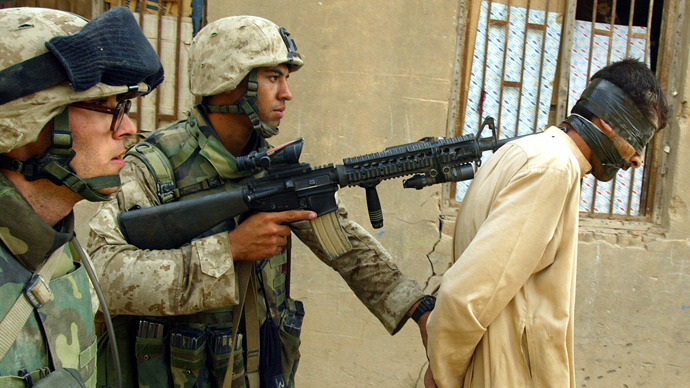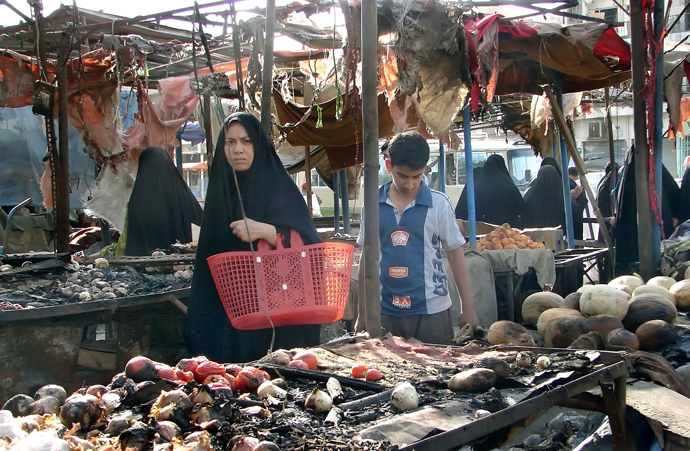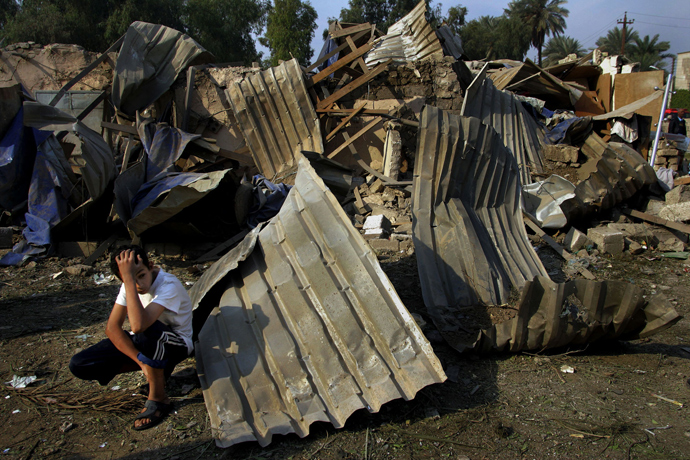‘War embedded in US policy, economy’

The decade since the US invasion of Iraq in 2003 has shown that “war is embedded in the nature of the American political and economic systems,” independent journalist Larry Everest stated in an interview with RT.
“It will take revolution…to actually end all these crimes that the US is committing around the world,” believes Everest. That includes the “killing of over a million of Iraqis, the displacement of 4 million and another 2 to 3 million in casualties. This is an enormous toll and it is never talked about here in the US,” he pointed out.
March 19 marked the 10th anniversary of the start of the Iraq War, which resulted in the downfall of the Saddam Hussein regime, led to hundreds of thousands deaths, a prolonged US military engagement which is not completely over and left the country in chaos and poverty.
Everest – who wrote the book 'Oil, Power & Empire: Iraq and the Global Agenda' – recalls what motives, in his opinion, were behind the American invasion of the republic in western Asia.
“During the war, the war was sold to the American people based on the lie that Saddam Hussein had weapons of mass destruction and was linked to Al-Qaeda. The word ‘oil’ was never even mentioned,” he told RT.
But in fact, “the motives for this war were grand imperialist agenda to restructure the entire Middle East and Central Asia and to use it in a geopolitical competition to make the US the world’s dominant super-power for decades to come,” Everest said, adding that oil was just one element of that broad agenda.

No glimmers of light in Iraq
Now locals say that investment in the energy industry has actually improved life in the north of Iraq. However, Larry Everest is confident that the money will not trickle down to the rest of the country “because Iraq has become even more firmly part of a global imperial and capitalist system.”
In his view, “oil is not going to benefit the Iraqi people.”
Besides that, despite years of fighting, “none of the underlying sectarian, religious or class conflicts has been resolved.” On the contrary, the US invasion has made things worse because they “installed the reactionary Shia government that came to power based on torture, massive ethnic cleansing, and violence backed by the US.”
The US itself has failed to fulfill its strategic goal to strengthen its position in the region.
“We can look across the region from Mali to Afghanistan – the US is in a deep quagmire. And one of the reasons that I think it’ll take fundamental reasons, we see [US President Barack] Obama attempting to do the same thing [former President George W.] Bush did, but in different circumstances and with different tactics,” the journalists stated. “This empire is vicious but it’s also vulnerable,” he concluded.
‘Bottom of devastation not reached yet’
The problem in Iraq is that there is a disaster on the one hand side, and lack of recognition by the world of what they have done: nobody wants to accept the responsibility for it, says Sabah Mukhtar, president of the Arab Lawyer Association.

“I think that the destruction done to the country – its social structure, economy, and the political scene – has been devastating and has not reached its bottom yet,” he stated.
In his view, the international community is now busy with Syria and other problems while “Iraq seems to be forgotten.”
The worst thing, Sabah Mukhtar said, is that there are many aid programs in the West, “a lot of people are talking about Iraq, but everybody tries to indicate it as if it was a natural disaster, as if nobody took part in it, made decisions.”
What’s the solution?
The legacy of what the US leaves behind after the war “raises horrific realities for the people of Iraq,” says Phyllis Bennis from the Institute for Policy Studies.
In her view, the first fix for the US would be to finally get out of Iraq. It “still has about 700 special forces there, 16,000 civilian contractors are being paid by the State Department,” she explained in an interview with RT.
That should be followed by “reparations and compensation,” Bennis believes.
Even though billions of dollars of international aid pour into Iraq, it is not actually helping the country, “because the aid is being distributed through corrupt government being kept in power by the US.” At the same time, the current Iraqi regime “barely can speak to anyone in Washington – they are far more allied with Iran these days.”
To figure out a better way to get the money to the Iraqi people rather than to the US-backed regime, “a thoroughly new method has to be created,” the expert stated. It could be some “combination of the United Nations and the Arab League, perhaps a grouping of neighboring states, or kind of involvement of non-governmental organizations,” she suggested.
The statements, views and opinions expressed in this column are solely those of the author and do not necessarily represent those of RT.












